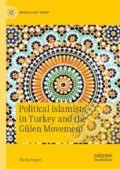Abstract
In order to help readers to better understand the comparison between the two Islamic groups a definition of the Gülen movement and its brief history are provided in the third chapter. Fethullah Gülen, the founder of the Hizmet Movement, is a well-known Turkish-Muslim scholar, philosopher, author, poet, educational activist, and preacher emeritus. Gülen completed his religious education and training under various prominent scholars and obtained the traditional Islamic license to teach (ijaza). Gülen was greatly influenced by historic figures such as Abu Ḫanīfa, Ghazali, Imam Rabbani, Jalal al-Din Rumi, Yunus Emre, and Said Nursi. During his youth, Gülen witnessed the erosion of traditional moral values among people which led youth into criminality, political and societal conflict. These experiences affected his ideology, community leadership and the Hizmet (service) movement. He did not take active part in politics, rather, he taught moral values and religious matters through his sermons and writings. He traveled from city to city to give sermons in mosques and speeches at gatherings in various places including theatres and coffee houses. His eloquent speeches attracted many people from different walks of life and were recorded on tape to distribute everywhere. The ideology of the Hizmet movement was shaped through his speeches and writings. Initially, his audience was people in Izmir from all walks of life and later it expanded to citizens from very different backgrounds, including non-Muslims, who share the humanistic aspects of his vision. During this time, he established the Hizmet (service) movement. Some scholars defined the movement as a faith-based social movement, a market friendly religious education movement, a modern manifestation of Islam which builds bridges not only among religions but also between democracy and Islam, a non-political movement not outside of politics, and an Islamic-based movement which has sought to combine a modern interpretation of Islam with Turkish nationalism. Due to its various functions, the Gülen movement has been defined in different ways. Usually, the Gülen movement is described by academics as a civic, social and religious group that was initiated in Turkey and then spread all over the world. They are known for their educational institutions that have been quite successful. They advocate interfaith and intercultural dialogue to build bridges between different cultures and religions all over the world.
Access this chapter
Tax calculation will be finalised at checkout
Purchases are for personal use only
Author information
Authors and Affiliations
Rights and permissions
Copyright information
© 2020 The Author(s)
About this chapter
Cite this chapter
Dogan, R. (2020). The Gülen Movement. In: Political Islamists in Turkey and the Gülen Movement. Middle East Today. Palgrave Macmillan, Cham. https://doi.org/10.1007/978-3-030-29757-2_3
Download citation
DOI: https://doi.org/10.1007/978-3-030-29757-2_3
Published:
Publisher Name: Palgrave Macmillan, Cham
Print ISBN: 978-3-030-29756-5
Online ISBN: 978-3-030-29757-2
eBook Packages: Political Science and International StudiesPolitical Science and International Studies (R0)

